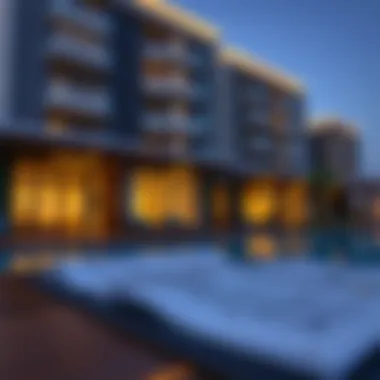Essential Guide to Apartment Insurance in Dubai


Intro
In the bustling city of Dubai, where skyscrapers touch the clouds and luxury is a way of life, apartment insurance has become a cornerstone for residents and investors alike. With a real estate market that never sleeps, understanding the nuances of this type of insurance is crucial to protect one of the most significant financial investments one can make.
Not only does apartment insurance safeguard against unforeseen disasters, but it also promotes financial security amidst the unpredictable nature of life in an expat-focused metropolitan center. The purpose of this guide is to unravel the complexities surrounding apartment insurance in Dubai by examining its essential policies, risks that can be mitigated, and the regulations that govern the landscape.
Through this guide, you will explore essential coverages and associated costs, offering you the insights necessary for making informed decisions in the vibrant Dubai real estate market. This isn’t just about protecting walls and windows; it’s about securing peace of mind in a city full of promise and opportunity.
Market Trends and Analysis
Current Market Overview
Dubai's real estate sector has shown remarkable resilience and innovation. In recent years, there has been a noticeable shift toward more sustainable living environments and smart homes, aligning with global trends. The demand for apartment insurance in Dubai has surged in tandem, as both investors and homeowners recognize the growing risks associated with urban living.
Instances of fire incidents, water damage, and even theft are not uncommon in densely populated areas. Hence, understanding the current trends in this market has become essential for potential buyers and renters.
Future Market Predictions
Looking ahead, expert analysts predict that the apartment insurance market in Dubai will continue to evolve. With advancing technology and the increasing need for comprehensive financial protection, more personalized insurance products are likely to emerge. This may include tailored policies that better fit the unique lifestyles of Dubai's diverse population.
“We are anticipating a greater integration of digital platforms for policy management and claims processing. This trend will not only enhance user experience but also boost transparency in the insurance process,” states a leading industry expert.
Investors can expect growth areas within niche markets, particularly for eco-friendly buildings and smart apartments, as awareness of environmental responsibilities increases among tenants and homeowners alike.
Investment Opportunities
Emerging Neighborhoods
Dubai’s landscape is changing, and with it, the places deemed desirable for investment. Neighborhoods like Dubai South and Al Furjan are gaining traction as potential hotspots. These areas offer a mix of affordability, location, and amenities that attract both residents and investors.
As demand grows in these emerging neighborhoods, so too does the need for comprehensive apartment insurance. Potential buyers should keep an eye on the dynamic shifts within the market.
Types of Properties for Investment
Investors in Dubai have multiple options when it comes to properties. Apartments vary widely—some are luxury high-rises, while others are cozy mid-range units. Here’s a quick glance at the types:
- Luxury Apartments: Geared towards high-net-worth individuals, these often come with premium amenities.
- Mid-Range Apartments: A solid choice for expatriates seeking affordable comfort amidst the bustling city life.
- Short-Term Rentals: With the rise of platforms like Airbnb, properties suitable for short-term stays are becoming increasingly popular.
Each of these property types carries its own set of risks and rewards, making it vital for potential investors to consider specific apartment insurance policies that cover their unique needs.
"Being knowledgeable in insurance choices is just as critical as choosing the right property. A well-informed decision can save both time and substantial costs down the line."
To gain deeper insights into the apartment insurance landscape and market trends, consider exploring resources from companies such as Dubai Land Department or industry reports available through Knight Frank.
By taking the time to understand the intricacies of apartment insurance, investors and residents can navigate the robust yet challenging Dubai real estate market with confidence.
Overview of Apartment Insurance
Apartment insurance may not be the most glamorous topic when one considers the vibrancy of Dubai's skyline or the luxurious lifestyle that many residents enjoy. Yet, it holds considerable significance for anyone calling an apartment in this bustling city their home. Understanding apartment insurance is essential not just for homeowners but also for investors and expatriates. As the housing market evolves, so does the necessity of having reliable insurance coverage that can safeguard one's assets.
Definition of Apartment Insurance
In simple terms, apartment insurance is a type of coverage designed to protect residents from potential financial losses associated with their living space. This insurance typically encompasses a variety of risks, such as property damage, liability concerns, and sometimes even personal items inside the apartment. It’s important to understand that while the building itself may have insurance through the homeowner's association or the landlord, individual apartment residents may still need their own policies.
There are different components that make up apartment insurance. Most policies cover:
- Personal property protection: This ensures that your belongings are insured against theft, fire, and other unforeseen mishaps.
- Liability coverage: If someone were to get hurt in your apartment, this protects you from potential medical costs or legal fees.
- Additional living expenses: If your apartment becomes uninhabitable—perhaps due to a fire—this feature would cover the costs of temporary housing.
Importance in Dubai's Housing Market
The importance of apartment insurance in Dubai cannot be overstated. With the city's rapid development and the influx of expatriates, the demand for quality housing has soared. Consequently, this increased demand has also put pressure on property values, making it all the more vital for residents and investors to ensure that their investments are protected.
Living in Dubai comes with its own unique set of risks. For instance, natural disasters, though not as frequent as in some other regions, can still pose a threat. The heat and humidity can lead to property damage if not managed correctly. Furthermore, with shared living spaces, the risk of liabilities can increase. One mishap can lead to considerable financial strain if not adequately insured.
"In a market like Dubai, one misstep can lead to a big financial hole. Protecting your apartment with sufficient insurance is not just smart; it's essential."
It is also worth noting that many landlords require tenants to have apartment insurance as part of the rental agreement. This not only protects the tenants' interests but also provides a layer of security for the property owner.


Thus, the understanding of apartment insurance is not merely an option; it’s a savvy decision, paving the way for financial safety and peace of mind in a fast-paced environment like Dubai.
Key Features of Apartment Insurance Policies
Apartment insurance serves as a cornerstone for safeguarding one's assets in Dubai's dynamic housing scene. Knowing the key features of these policies helps residents and investors understand what protections are available and why they hold significance in today's market. A solid grasp of these features allows individuals to make educated choices tailored to their specific needs, ultimately protecting their investments and promoting peace of mind.
Coverage Types
Personal Property Protection
Personal Property Protection is arguably one of the most essential components of apartment insurance. This feature encompasses items such as furniture, electronics, and personal belongings. In a fast-paced city like Dubai, where expatriates and locals alike invest in significant valuables, the importance of securing these assets cannot be overstated.
One key characteristic of this coverage is its ability to reimburse policyholders in case of theft, fire damage, or vandalism. This aspect is particularly appealing for those living in shared buildings, where risks can sometimes be higher due to communal spaces. However, while it offers great peace of mind, policyholders should be aware of coverage limits, which can sometimes be a disadvantage if one possesses high-value items.
Liability Coverage
Liability coverage is another critical facet of apartment insurance, designed to shield you from financial fallout if someone is injured on your property. Given Dubai's bustling social scene, the potential for accidents may not be as low as one may think. The key characteristic of this coverage is that it includes legal fees and medical costs for injured parties, effectively covering substantial expenses that may arise.
This feature is popular among many tenants and homeowners because of its broad protection scope; however, potential policyholders should closely examine the terms and limits of this coverage. Understanding specific exclusions is crucial, as not all accidents will be fully covered, which could lead to significant out-of-pocket expenses in more severe cases.
Additional Living Expenses
Sometimes, unpredicted circumstances require one to temporarily vacate their apartment. Additional Living Expenses (ALE) coverage caters to this situation. In the event of a disaster that renders your living space uninhabitable—like fire damage or extensive water leaks—ALE helps you cover the costs of hotel stays, food, and additional necessities during this challenging period.
This coverage is particularly beneficial because it helps to alleviate the financial burden during dire circumstances. However, it’s worth noting that ALE coverage often includes specific time frames and limits, which may not be adequate for longer repairs. Policyholders must clarify these aspects to ensure they receive the support they need in such situations.
Exclusions and Limitations
Every insurance policy has its exclusions and limitations, and understanding them is vital. Many policies do not cover certain natural disasters or intentional damages, which may lead to unpleasant surprises during the claims process. Prior to purchasing a policy, individuals should carefully examine these clauses, as they can vary significantly between providers.
Moreover, common limitations include wear and tear or damages caused by neglect. Review all terms meticulously to avoid future complications.
Policy Riders and Add-ons
Often, standard apartment insurance policies may not fully meet individual needs. This is where policy riders and add-ons come into play. Riders allow policyholders to enhance their coverage by adding specific protections, which are essential for those with unique circumstances. For example, additional coverage for high-value items like jewelry or art could be more than necessary for a standard policyholder.
On the flip side, adding too many riders could also inflate premium costs significantly. Therefore, it’s wise to weigh the benefits against the potential expenses when considering these options. Always engage directly with insurance agents to gain insight into which riders best suit your lifestyle and belongings.
Understanding these features not only empowers investors and homeowners in Dubai but provides a roadmap for approaching the sometimes-daunting world of apartment insurance. As the market continues to evolve, staying well-informed about key elements like coverage types, exclusions, and potential add-ons remains crucial for anyone looking to secure their home effectively.
Potential Risks and Liabilities
Among the various aspects of apartment insurance, understanding potential risks and liabilities stands out as paramount for residents and owners alike. In Dubai, where urban living meets rapid development, awareness of these risks transcends mere prudence; it lays the foundation for safeguarding investments and ensuring peace of mind. Residents must grasp the specter of uncertainty lurking around every corner, whether it be natural disasters, theft, or the intricacies of shared living spaces.
Highlighting these risks is crucial. For investors or homeowners, it’s not simply about insurance policies but about understanding which potential liabilities can impact personal and financial well-being. This foresight can save a great deal of heartache down the road.
Natural Disasters and Climate Impacts
Dubai’s climate, characterized by soaring temperatures and occasional torrential rains, raises concerns about potential natural disasters. While the region is not prone to many disasters like earthquakes, flooding remains a significant risk, especially in low-lying areas. In addition, the intensity of climate change is unearthing new threats, such as sandstorms that can damage property and affect living conditions.
Key considerations regarding natural disasters include:
- Flooding Risks: Homes in flood-prone areas need special attention. Insurance may cover water damage only up to certain standards.
- Airborne Particles from Sandstorms: Particles can infiltrate living spaces, which may not be covered under all policies.
- Climate Resilience: Properties integrating sustainable building materials may offer greater protection against climate impacts.
Theft and Vandalism
While Dubai is recognized for its relative safety, that does not render it immune to petty crime. Theft and vandalism can happen even in well-guarded communities. Properties, particularly those left unattended for periods, become prime targets. Understanding how theft affects coverage and what can be done to mitigate the risk is essential.
Important points regarding theft and vandalism include:
- Home Security Systems: Using alarm systems and surveillance cameras can lower insurance premiums, showcasing that homeowners take prevention seriously.
- Policy Clauses: Not all insurance coverages are the same. It’s vital to read the fine print regarding theft and understand the limits on claims.
- Neighborhood Watch: Engaging in community initiatives not only makes areas safer but can also reflect positively in insurance assessments.
Liability Risks in Shared Spaces
Living in apartments often means sharing common spaces such as lobbies, gyms, and pools. These shared areas increase exposure to liability claims. In cases of accidents or injuries, determining accountability can become as tangled as a ball of yarn.
To tackle liability risks effectively, consider the following:
- Clear Contracts: Understand the clauses related to shared responsibilities, which can help delineate liability in case of accidents.
- Insurance for Common Areas: Ensure that the building’s master policy covers shared facilities and public spaces.
- Safety Protocols: Promoting safety and maintenance within shared areas can significantly reduce the likelihood of accidents.


"Awareness is half the battle; knowing what to protect against is crucial in minimizing risks."
As we unpack these potential risks and liabilities, it's clear that they emphasize the critical need for comprehensive understanding in an ever-evolving market such as Dubai's. With the right precautions, awareness, and insurance policies in place, residents can navigate through uncertainties with confidence.
Regulatory Framework Governing Apartment Insurance
Apartment insurance in Dubai plays a crucial role in safeguarding investments and assets in the ever-evolving real estate market. A firm regulatory framework enhances trust, consistency, and accountability in the sector. Understanding the laws and regulations that govern apartment insurance is essential for residents, investors, and expatriates alike. It ensures that individuals are well-protected and guarantees that insurance providers uphold their responsibilities.
Insurance Laws in the UAE
Insurance laws in the UAE are quite specific in delineating responsibilities both for insurers and policyholders. The Insurance Authority (IA) regulates this sector, implementing frameworks designed to protect consumers while fostering a competitive market among providers. In essence, these laws aim to:
- Streamline processes for obtaining insurance cover.
- Establish standards that insurers must maintain related to financial stability and service delivery.
- Protect customers from unethical business practices.
For instance, the law mandates that companies disclose clear details about the terms of their policies, including coverage limits, exclusions, and how claims can be filed. This transparency proves to be beneficial for buyers, pushing them to make informed decisions when selecting an appropriate policy. Homeowners can be confident knowing they possess a legal foundation that safeguards their interests.
Furthermore, Dubai's legal structure places a premium on customer rights, allowing residents to pursue grievances through formal channels when necessary. Overall, an understanding of the insurance laws in the UAE gives policyholders a sense of assurance that there is a governing body keen on protecting their rights.
Regulating Authorities
The UAE has established several regulating authorities that play a pivotal role in the apartment insurance landscape. These organizations ensure that both consumers and providers adhere to the legal framework, allowing for a fair and transparent environment. The major regulatory bodies include:
- Insurance Authority (IA): This agency is the principal governing body ensuring all insurance practices adhere to the laws of the UAE. It is directly involved in licensing insurance companies, and it enforces regulations to protect policyholders.
- Central Bank of the UAE: Although primarily focused on banking, the Central Bank also oversees financial stability within the insurance sector, overseeing investment and capital controls that protect policyholder interests.
- Dubai Financial Services Authority (DFSA): This independent regulator governs financial services conducted in the Dubai International Financial Centre (DIFC) and ensures compliance among insurances that cater to this sector.
- Federal Law: Federal Law No. 6 of 2007 emphasizes the need for maintaining transparency and integrity across the insurance sector. It forms the backbone of ethical insurance practices in Dubai.
Approaching apartment insurance with a clear understanding of these authorities helps build a strong foundation of trust. They ensure that insurance companies unequivocally follow fair practices, providing clients with the clarity and assurance they need while navigating through challenging waters.
Understanding Premiums and Costs
Navigating the landscape of apartment insurance in Dubai means coming to grips with the intricacies of premiums and overall costs associated with different coverage options. This section is pivotal for investors and residents alike, as understanding how premiums work can significantly influence financial decisions when it comes to safeguarding one’s property. With a booming real estate market, grasping the dynamics of premiums is essential for those looking to protect their assets in the vibrant city.
Factors Influencing Premium Costs
Location and Property Type
When it comes to apartment insurance, the location and property type play a significant role in determining premium costs. Properties located in high-demand areas such as Dubai Marina or Downtown Dubai often command higher premiums due to the potential for higher risks, including theft or property damage. Conversely, suburban areas like Jumeirah Village Circle might offer lower premiums due to perceived lower risks.
Additionally, the type of property significantly affects cost. A luxury apartment with high-end finishes and amenities may incur a steeper insurance premium. This is mainly because the coverage amount needed to replace or repair such a property is inherently higher. Investors should also consider the unique features of the building—condominiums may require specialized coverage compared to standard apartments, reflecting the risks associated with common areas and community facilities.
Coverage Amount
The coverage amount represents the maximum sum assured under an insurance policy, critical in guiding the premium pricing. A higher coverage amount usually results in a higher premium. This is crucial for individuals looking to ensure that their assets are fully protected in case of significant incidents such as fire or flooding.
Choosing the right coverage amount is a balancing act. On one side, opting for a low coverage might save money on premiums, but it can mean insufficient compensation if disaster strikes. On the flip side, selecting a coverage too high may unnecessarily inflate costs. Assessing personal needs and property value is vital to landing the sweet spot that provides effective coverage without breaking the bank.
Deductibles
Deductibles are another important aspect influencing how much policyholders pay in premiums. This is the portion of a claim that the insured must pay out of pocket before the insurance kicks in. A higher deductible generally results in lower premium costs. Some may see this as a beneficial option, allowing for reduced regular payments.
However, it’s essential to weigh this against the risk of a loss. For instance, if one's property experiences frequent claims, opting for a high deductible might eventually lead to higher out-of-pocket expenses during claims processing. Therefore, selecting an appropriate deductible requires careful consideration of personal financial situations and risk tolerance levels.
Cost Comparison Among Insurance Providers
When selecting insurance, comparing costs among different providers becomes crucial. However, it is not just about finding the cheapest option; quality of service, policy features, and the insurer's reputation play significant roles too.
Here are several tips when going through the cost comparison process:
- Seek multiple quotes: Gather information from various insurance companies to find competitive rates.
- Understand policy inclusions: Look beyond the price tag; ensure that you are comparing similar coverage types.
- Read reviews: Assess customer experiences to gain insights into the provider's reliability and claims handling.
Navigating the Claims Process
Navigating the claims process is a crucial aspect of apartment insurance in Dubai, enabling policyholders to effectively secure their entitlements when faced with unexpected incidents. It's one thing to have an insurance policy, but knowing how to file a claim properly can make a world of difference during a challenging time. Understanding this process not only alleviates frustration but also ensures that you can adequately protect your investment.
Steps to File a Claim
Filing a claim involves several clear steps, each vital to ensuring a smooth experience. Here’s a straightforward guide to navigate the often overwhelming bureaucracy:
- Notify Your Insurance Provider: As soon as an incident occurs, contact your insurance company to inform them about the situation. Most policies have specific time frames for reporting incidents, so you don’t want to drag your feet on this one.
- Document the Incident: Collect evidence related to the loss or damage. Take photographs, gather receipts, and compile any additional documents that can support your claim. Being thorough here can strengthen your position.
- Complete the Claim Form: Obtain a claims form from your insurance company. Fill it out accurately and provide all required details. Keep it straightforward, but don't skimp on the details.
- Submit Supporting Materials: Along with the claim form, attach your evidence. This documentation should clearly demonstrate the extent of the damages or losses you’re claiming.
- Follow Up: After submitting your claim, keep communication lines open with your insurer. Follow up regularly to check on the progress and ensure everything is on track.
- Review the Settlement Offer: Once your claim is processed, the insurer will provide a settlement offer. Examine it carefully. Don’t hesitate to ask questions or negotiate if needed, especially if the offer doesn't seem to align with your documented losses.
Common Challenges in Claim Processing


Even with all the right steps followed, the claim process can be riddled with obstacles. Here are some common challenges faced by policyholders:
- Delays in Processing: Insurance companies often experience high volumes of claims, which can lead to delays. Be proactive about checking in and ensuring your claim is moving along.
- Disputes Over Coverage: Sometimes, insurers might argue about whether certain damages fall under coverage. Having your documentation can help clarify these points.
- Insufficient Evidence: Lacking adequate documentation or evidence can hamper claim approvals. Being meticulous in your record-keeping is essential.
- Miscommunication: Misunderstandings can arise between you and the insurance representative. To avoid this, always confirm what has been discussed and agreed upon.
"Understanding the claims process is not just about following steps; it's about being an informed policyholder who can effectively communicate with your insurance provider."
Navigating the claims process effectively can mean the difference between a seamless experience and a frustrating one. By being informed and proactive, you comprise a better chance of securing the necessary support during unexpected events.
Selecting an Insurance Provider
Choosing the right insurance provider is critical when navigating the complicated landscape of apartment insurance in Dubai. With a myriad of options available, it’s essential to approach the decision-making process with clarity. The insurance provider you select can significantly impact your financial security—both short-term and long-term. Having a reliable insurance partner ensures you’re protected against unforeseen events that could disrupt your peace of mind and financial stability. Furthermore, a well-chosen provider can guide you in understanding the nuances of various policies, helping you to make informed decisions.
Evaluating Insurance Companies
When evaluating potential insurance companies, several factors come into play. Here are some essential points to consider:
- Reputation: Check how the company is regarded among customers and in professional circles. A solid reputation often signals reliability.
- Financial Stability: Investigate their financial ratings. Companies with higher ratings are less likely to face bankruptcy or inadequately meet claims.
- Coverage Options: Understand what types of policies they offer. Some may provide comprehensive coverage, while others might excel in niche areas relevant to your needs.
By conducting thorough research and taking the time to evaluate your options, you can select an insurance provider that aligns with your specific situation.
Customer Reviews and Service Quality
Customer feedback is invaluable in determining the quality of an insurance provider. Engaging with past and present customers can shed light on the following aspects:
- Claims Process: Are customers generally satisfied with how claims are handled?
- Customer Service: How accessible and helpful is the support team? Quick responses and helpful guidance can make a significant difference.
- Flexibility: Does the company demonstrate adaptability in customizing coverage to meet diverse needs?
Reading reviews on platforms such as Reddit or checking out Insurance.com can provide insightful perspectives. Remember to consider both positive feedback and negative experiences, as they can inform your understanding of what to expect.
"Choosing an insurance provider is more than just picking a name from a list; it's about finding a partner in safeguarding your future."
Invest time in gathering information about your selected providers, and don’t hesitate to ask detailed questions when speaking with agents. A company’s willingness to provide clear, informative answers can be a telltale sign of how they will handle your insurance needs in the future.
Future Trends in Apartment Insurance
In the ever-evolving landscape of apartment insurance in Dubai, staying ahead of the curve is essential for both homebuyers and renters. The dynamics of urban living, combined with technological advancements, are reshaping the insurance sector. This section digs into what is on the horizon, emphasizing the significance of being aware of future trends affecting apartment insurance.
Understanding these trends can arm investors, homeowners, expatriates, and agents with the knowledge to better protect their investments and navigate potential uncertainties.
Technological Advances in Insurance
The rise of technology has significantly altered the way insurance products are developed and delivered. These days, it’s not just about protecting your property but also using technology to enhance the insurance experience. Several notable trends are emerging:
- Digital Platforms: Many insurance companies in Dubai have invested in user-friendly platforms. These websites and mobile applications streamline the process for policyholders, making everything from quote comparisons to claims filing much simpler.
- Smart Technology Integration: With smart home devices permeating residential areas, insurers are starting to offer discounts or specialized policies for those who adopt such technologies. For instance, a home equipped with a security system may benefit from lower insurance premiums due to reduced risk of theft or damage.
- Data-Driven Analytics: Insurers are tapping into big data for better risk assessment. By analyzing patterns, they can offer more personalized policies. This means individuals might pay for exactly what they need, leaving behind the one-size-fits-all approach.
"Embracing technology not only makes the process smoother but also contributes to better risk management, enabling both policyholders and insurers to benefit."
Emerging Risks in Urban Living
As Dubai continues to grow and urbanize, new risks emerge that could impact apartment insurance policies. Keeping an eye on these trends ensures that coverage remains comprehensive and relevant:
- Increased Population Density: With more people moving into urban areas, the risk of incidents such as fire or other communal hazards escalates. Properties in high-density areas may need more tailored coverage to manage these risks.
- Environmental Concerns: Climate change and its effects aren't just buzzwords; they significantly impact urban living. Incidents like flooding, although historically not widespread in Dubai, are becoming more of a concern. Insurers may start considering environmental impact assessments for policies.
- Cybersecurity Threats: As homes get smarter, they also become more vulnerable to cyber-attacks. Insurance providers might soon offer policies that not only cover physical damage but also assist in case of data breaches or hacking of smart devices.
The insights into technological enhancements and emerging risks can help stakeholders understand how to better protect themselves against potential pitfalls in Dubai's bustling real estate landscape. Armed with this knowledge, policyholders can seek out innovative insurance solutions tailored to their unique circumstances. In today's fast-paced environment, awareness is indeed the first step towards proactive risk management.
Closure and Final Thoughts
Navigating the world of apartment insurance in Dubai is a pivotal aspect that every resident, investor, and expatriate must grasp. The significance can not be overstated. Dubai’s dynamic housing market demands a clear understanding of how insurance can safeguard both personal property and financial stability. As you wrap your head around various policies and coverages, it becomes clear that the right apartment insurance can serve as a safety net against unforeseen mishaps and risks.
In this guide, we’ve discussed myriad elements that contribute to making informed decisions about apartment insurance. From comprehending the nuances of regulatory frameworks to the critical features of different insurance offerings, the information is designed to empower you. Understanding each layer—be it coverage types, premium costs, or the step-by-step claims process—helps protect not just investments, but also peace of mind in an ever-evolving urban landscape.
"Insurance is a refuge, an umbrella in the storm of unpredictability."
Moreover, recognizing the future trends in apartment insurance opens doors to smarter, more adaptive policies that can adjust to emerging risks. With technology playing a pivotal role, staying informed means you can certainly embrace changes in the market more effectively. Overall, the art of choosing the right insurance policy should not be taken lightly. It is about protecting your home and securing your future in a city brimming with opportunity.
Summary of Key Points
- Apartment insurance in Dubai provides essential protection against risks like theft, natural disasters, and liability.
- Understanding the specifics of various coverage options is vital for making informed choices.
- The regulatory framework helps consumers navigate the tricky landscape of insurance products effectively.
- Future trends point towards greater reliance on technology in insurance processes.
Making Informed Decisions
When it comes to making decisions about apartment insurance, knowledge truly is power. Familiarize yourself with key aspects such as:
- Coverage Types: Different policies cover different risks; understanding these ensures you select one that meets your needs.
- Cost Factors: Premium amounts can differ based on location, property type, and coverage depth. Thus, it's prudent to compare costs across numerous providers.
- Claims Process: Knowing how to file claims and the common roadblocks in processing claims can save you from stress down the line.
In essence, investing time in grasping the intricacies of apartment insurance is not just beneficial; it’s necessary for anyone looking to make a home in Dubai’s vibrant market. The tools and insights you’ve gathered from this article equip you to approach the insurance process with confidence and clarity.







